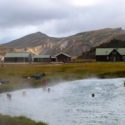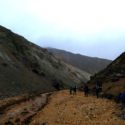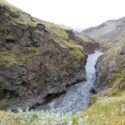Exercise Vulcan EMU was a trekking expedition run between the dates 26/08/2014 until 05/09/2014 for Officer Cadets of East Midlands UOTC. Led by (IC) Officer Cadet Marcus Robertson and (2IC) 2Lt Darren Hastings, the expedition was instructed by Major David Larkam.
The aim of the expedition was to improve the team members experience of trekking in a new and challenging environment over an extended period of time.
The expedition began at the units Army Reserve Centre in Nottingham where we took the time to organise, issue and familiarise the group members with the large amount of kit we had collected. After an introduction to the kit and instruction on how to pack accordingly, we set off to London Gatwick for our two and a half hour flight to Keflavik airport, Iceland.
After arriving in Keflavik, transport had been organised to take the group across to Reykjavik. A forty five minute journey along the coast that would drop us off at the capital city’s only campsite where we were to stay our first night.
The next morning, the group packed up camp and got on the transport to Landmannalaugar to begin the four hour journey into the Southern highlands of Iceland. Along the way we got to see incredible scenery that is unheard of anywhere else in the world due to its volcanic nature, especially notable was the Hekla volcano that we passed on the journey.
Upon arrival, after setting up camp, the group went on a small trek around the area, visiting the nearby lava field and using the time to orientate the kit such as GPS’s to our location. After this we retreated to the hot natural pools that were frequently used by travellers for bathing when visiting the campsite.
The first morning of the trek the team got up early and set off for our first campsite at Hraftinnusker. Along the route to Hraftinnusker we passed through an area of sulphur pits which was an interesting experience for anybody in the team who had not experienced this type of geological feature before. All along this route the weather was poor which dampened the mood of the group a bit due to the rain.
Regardless of this however, the group arrived at the campsite in very good time and took a well deserved break, taking in the mountains and incredible scenery. The decision was made at this point to push straight onto Alftavatn due to guides from the mountain hut informing us that the weather at this altitude was forecast to get a lot worse overnight.
The group was more than happy to continue after receiving this warning and so set off for our next campsite at Alftavatn.
After a few more hours of walking the group finally arrived at Alftavatn and set up camp in the already deteriorating weather. Here the team received another warning that there was a storm forecast for the following night and that trekkers were being advised to get off of the trail as soon as possible.
The next morning the team packed up camp and set off for Thorsmork, a 33km trek in total that proved to be difficult but extremely rewarding. Along the way the team encountered numerous different types of terrain that Iceland is famous for, such as lava fields, glaciers, ash deserts, canyons and mountain passes.
On this leg of the journey the team also had to contend with river crossings which was an invaluable lesson in itself on how to handle the situation safely.
Upon reaching Thorsmork we set up camp in preparation for the storm that was expected. The time that we spent doing this paid off well as the following storm did not disappoint, the team was forced to spend the day inside due to the high winds and high levels of rain which made it too dangerous to venture out of the campsite.
All in all the trip achieved its aim of improving the team members experience of trekking in a new and challenging environment over an extended period of time, and in surroundings that are uncommon in other areas of the world.
The group has left Iceland with a much greater understanding of its people, culture and environment, vastly developing the experiences of each individual group member and leaving the majority of the group eager to continue in this field of training.



